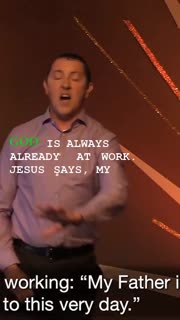Aligning Our Lives with God's Will and Purpose
Devotional
Sermon Summary
Bible Study Guide
Sermon Clips
1. "The scriptures teach that when we align with God, it ignites this kind of life. And so because it's back to school season, because I struggled mightily through early algebra, I've been putting this in algebra equation, not because it's a formula, but because it's just an easier way to kind of hook into this and remember, kind of what do we need to align with? We put it this way that when we align with goddess truth, the truth about who God is, that God is good, God is wise, God is just, God is holy, God is love. We align it around the truth of who God is, the truth of God's purposes in the world, kind of what's God up to in the world? What does God want to do in the world? And God's commands always serve his purposes. So how do we align ourselves with God's purposes in the world? And aligning through God's commands is one of the ways we do that." [26:13] (42 seconds)
2. "The scriptures describe this kind of life as bearing the fruit of the spirit. The fruit of the spirit is a great description that the apostle Paul writes. Love, joy, peace, patience, kindness, goodness, faithfulness, gentleness, self control. You live that kind of life. It's a gift to you and everyone around you, right? So we're talking about aligning with God, igniting this kind of life. Now, today we're picking up on a story right after Jesus does this amazing healing. It's a wonderful gift, but it makes people around him angry. And what this is gonna emerge, what this is gonna surface is this, that you can be totally aligned with God and the good life and not everybody's gonna like it. You can be totally aligned with God and his purpose is for you and in the world." [27:40] (44 seconds)
3. "What Jesus shows us is sort of this thing that we're talking about there at the very beginning, that this. That to live the good life does not mean the smooth life, however you might define smooth. To live the good life before the Lord does not mean the smooth life. Right. For some of us. Think about the good life. For some of you, the good life is no conflict, right? Wouldn't that be great? No conflict, no fights. Some of you, that's like your prime directive. And Jesus is like, no, no, no. That's not the good life. That's not the life I'm calling you to." [31:18] (30 seconds)
4. "The people that are set against him have approximately zero part of the ignite equation. He's not out to pick a fight. He's just out to honor God the father. If it makes people mad, so be it. And if people like it, so be it. Jesus, throughout the course of his life, is remarkably ambivalent about people's applause or their disapproval. He just honors God. Jesus is not motivated by being against anyone. He was against sin and death, and inasmuch in as far as people were tangled up in sin and death, he was against them. But Jesus was not motivated by being primarily against anyone." [33:47] (39 seconds)
5. "God is always already at work. Jesus says, my father is always working to this very day. So I'm just jumping in with whatever he's up to. God's always at work. See, sometimes you come to a fork in the road or a major decision, and you're like, God, where are you, God, what do you want me to do? What do you want me to do? What do you want me to do? What do you want me to do? It's a great question, but what if the prayer was God? I'm at this major fork in the road. What are you already doing? How are you already at work? What if that was your prayer? What if the prayer was God, what are you already up to?" [36:47] (34 seconds)
6. "You can learn what his voice does not sound like, because you're going to hear all kinds of voices, right? You can start with clearing out the clutter. Jesus's voice does not sound like anxiety. Doesn't sound like ambition, doesn't sound like fear. Doesn't sound like harsh criticism or anger or rage. Jesus voice does not sound like jealousy. Jesus voice does not sound like revenge. Jesus voice does not sound like lust. Jesus voice does not sound like a whole bunch of things that you and I hear all the time. So part of the work that we get to do as Jesus followers is we get to clear out the clutter. And part of the ways that you know that this is not the voice of the good shepherd is when you obey those voices, it doesn't bear the fruit of the spirit." [39:06] (44 seconds)
7. "What do you do when you're trying to make a decision? What do you do when you're at a place, a fork in the road trying to figure things out? One, God, what are you already up to? What are you doing? Jesus promised means you're always at work. Two, Jesus promises that his sheep will know his voice. Lord Jesus, I believe you're speaking. Help me to hear it, Lord. I hear these other voices. Help me to get rid of those voices. And then two, the second thing that you can do to hear the good shepherd's voice to know what the good shepherd sounds like is this. Learn what the words of Jesus sound like. What the voice of Jesus sounds like by studying his words and his works in the scriptures." [42:33] (30 seconds)
8. "God's will was like a giant minefield. One wrong step, and it blew up, and you lost an appendage. It's not a really healthy way to think about God's will, really. Actually, in retrospect, that's kind of where I was. And then I heard a. Then I heard a speaker who kind of framed it up in a slightly different, I think, more faithful way, honestly. So here's what I want to propose to you. That God's general will looks more like this. It looks more like a playground with a fence than a minefield. Looks more like a playground with events rather than minefield. Here's what God does. God creates everything beautiful and good. He creates us in his image. And then he says, here's what I'm about. I want you to love God. Love your neighbor. I want you to do justice, love mercy. Walk humbly with me. I want you to repent of your sin. I want you to leave sin behind so that you can be free from the slavery to sin and death forever and ever to amen." [45:16] (52 seconds)
9. "The same God that came through for Jesus will come through for you. The same God that came through for Jesus will come through for you. The same God that came through for Jesus and raised him from the dead will come through for you too. Jesus goes to the cross as the son of God. He doesn't look at the son of God, does he? No one around him thinks he's the son of God. Everyone's making fun of him. He saved others. He can't even save himself. But even when Jesus is dying, a slow, torturous, shame filled death and everyone's making fun of him, he still knows who he is. Doesn't change who he is. He's still the son of God. The son of God. And on the third day, God raises them from the dead and he lives." [54:39] (37 seconds)
10. "Confession is not about heaping on shame and guilt. It's about relieving shame and guilt. Confession is not piling on how bad you are. Confession is. Well, here's the mess. Thank you for forgiving this. Take the mess away from me. I exchanged my mess for your grace. That's what confession is. So a couple months ago, Brian Emmett, who preached here last week, thanks Brian for preaching. Last week he shared with me a prayer of confession that his church used to pray. And what I'm going to do is I'm going to read through this and give you a chance to read through it, just silently. And then we're going to, if you're willing and able and want to, we're going to recite this prayer of confession together as a way of entering into the amazing grace of Jesus for the forgiveness of our sins as we settle into our time of communion." [56:19] (34 seconds)
Ask a question about this sermon
2. "The scriptures describe this kind of life as bearing the fruit of the spirit. The fruit of the spirit is a great description that the apostle Paul writes. Love, joy, peace, patience, kindness, goodness, faithfulness, gentleness, self control. You live that kind of life. It's a gift to you and everyone around you, right? So we're talking about aligning with God, igniting this kind of life. Now, today we're picking up on a story right after Jesus does this amazing healing. It's a wonderful gift, but it makes people around him angry. And what this is gonna emerge, what this is gonna surface is this, that you can be totally aligned with God and the good life and not everybody's gonna like it. You can be totally aligned with God and his purpose is for you and in the world." [27:40] (44 seconds)
3. "What Jesus shows us is sort of this thing that we're talking about there at the very beginning, that this. That to live the good life does not mean the smooth life, however you might define smooth. To live the good life before the Lord does not mean the smooth life. Right. For some of us. Think about the good life. For some of you, the good life is no conflict, right? Wouldn't that be great? No conflict, no fights. Some of you, that's like your prime directive. And Jesus is like, no, no, no. That's not the good life. That's not the life I'm calling you to." [31:18] (30 seconds)
4. "The people that are set against him have approximately zero part of the ignite equation. He's not out to pick a fight. He's just out to honor God the father. If it makes people mad, so be it. And if people like it, so be it. Jesus, throughout the course of his life, is remarkably ambivalent about people's applause or their disapproval. He just honors God. Jesus is not motivated by being against anyone. He was against sin and death, and inasmuch in as far as people were tangled up in sin and death, he was against them. But Jesus was not motivated by being primarily against anyone." [33:47] (39 seconds)
5. "God is always already at work. Jesus says, my father is always working to this very day. So I'm just jumping in with whatever he's up to. God's always at work. See, sometimes you come to a fork in the road or a major decision, and you're like, God, where are you, God, what do you want me to do? What do you want me to do? What do you want me to do? What do you want me to do? It's a great question, but what if the prayer was God? I'm at this major fork in the road. What are you already doing? How are you already at work? What if that was your prayer? What if the prayer was God, what are you already up to?" [36:47] (34 seconds)
6. "You can learn what his voice does not sound like, because you're going to hear all kinds of voices, right? You can start with clearing out the clutter. Jesus's voice does not sound like anxiety. Doesn't sound like ambition, doesn't sound like fear. Doesn't sound like harsh criticism or anger or rage. Jesus voice does not sound like jealousy. Jesus voice does not sound like revenge. Jesus voice does not sound like lust. Jesus voice does not sound like a whole bunch of things that you and I hear all the time. So part of the work that we get to do as Jesus followers is we get to clear out the clutter. And part of the ways that you know that this is not the voice of the good shepherd is when you obey those voices, it doesn't bear the fruit of the spirit." [39:06] (44 seconds)
7. "What do you do when you're trying to make a decision? What do you do when you're at a place, a fork in the road trying to figure things out? One, God, what are you already up to? What are you doing? Jesus promised means you're always at work. Two, Jesus promises that his sheep will know his voice. Lord Jesus, I believe you're speaking. Help me to hear it, Lord. I hear these other voices. Help me to get rid of those voices. And then two, the second thing that you can do to hear the good shepherd's voice to know what the good shepherd sounds like is this. Learn what the words of Jesus sound like. What the voice of Jesus sounds like by studying his words and his works in the scriptures." [42:33] (30 seconds)
8. "God's will was like a giant minefield. One wrong step, and it blew up, and you lost an appendage. It's not a really healthy way to think about God's will, really. Actually, in retrospect, that's kind of where I was. And then I heard a. Then I heard a speaker who kind of framed it up in a slightly different, I think, more faithful way, honestly. So here's what I want to propose to you. That God's general will looks more like this. It looks more like a playground with a fence than a minefield. Looks more like a playground with events rather than minefield. Here's what God does. God creates everything beautiful and good. He creates us in his image. And then he says, here's what I'm about. I want you to love God. Love your neighbor. I want you to do justice, love mercy. Walk humbly with me. I want you to repent of your sin. I want you to leave sin behind so that you can be free from the slavery to sin and death forever and ever to amen." [45:16] (52 seconds)
9. "The same God that came through for Jesus will come through for you. The same God that came through for Jesus will come through for you. The same God that came through for Jesus and raised him from the dead will come through for you too. Jesus goes to the cross as the son of God. He doesn't look at the son of God, does he? No one around him thinks he's the son of God. Everyone's making fun of him. He saved others. He can't even save himself. But even when Jesus is dying, a slow, torturous, shame filled death and everyone's making fun of him, he still knows who he is. Doesn't change who he is. He's still the son of God. The son of God. And on the third day, God raises them from the dead and he lives." [54:39] (37 seconds)
10. "Confession is not about heaping on shame and guilt. It's about relieving shame and guilt. Confession is not piling on how bad you are. Confession is. Well, here's the mess. Thank you for forgiving this. Take the mess away from me. I exchanged my mess for your grace. That's what confession is. So a couple months ago, Brian Emmett, who preached here last week, thanks Brian for preaching. Last week he shared with me a prayer of confession that his church used to pray. And what I'm going to do is I'm going to read through this and give you a chance to read through it, just silently. And then we're going to, if you're willing and able and want to, we're going to recite this prayer of confession together as a way of entering into the amazing grace of Jesus for the forgiveness of our sins as we settle into our time of communion." [56:19] (34 seconds)










